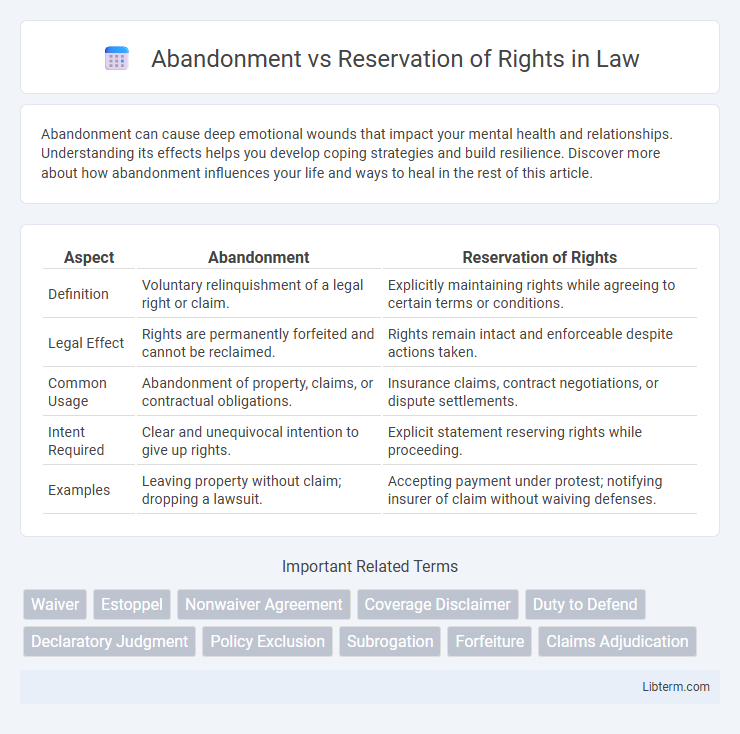Abandonment can cause deep emotional wounds that impact your mental health and relationships. Understanding its effects helps you develop coping strategies and build resilience. Discover more about how abandonment influences your life and ways to heal in the rest of this article.
Table of Comparison
| Aspect | Abandonment | Reservation of Rights |
|---|---|---|
| Definition | Voluntary relinquishment of a legal right or claim. | Explicitly maintaining rights while agreeing to certain terms or conditions. |
| Legal Effect | Rights are permanently forfeited and cannot be reclaimed. | Rights remain intact and enforceable despite actions taken. |
| Common Usage | Abandonment of property, claims, or contractual obligations. | Insurance claims, contract negotiations, or dispute settlements. |
| Intent Required | Clear and unequivocal intention to give up rights. | Explicit statement reserving rights while proceeding. |
| Examples | Leaving property without claim; dropping a lawsuit. | Accepting payment under protest; notifying insurer of claim without waiving defenses. |
Understanding Abandonment: Legal Definition
Understanding abandonment in legal terms involves the intentional relinquishment of a known right, property, or claim without transferring it to another party. This concept is critical in property law, where abandonment may result in loss of ownership or rights if the owner demonstrates clear intent to forgo those rights. Courts examine objective evidence such as actions, statements, or circumstances to determine if abandonment has occurred.
What is a Reservation of Rights?
A Reservation of Rights is a legal declaration made by an insurer to notify the policyholder that coverage may be limited or denied for certain claims while the insurer investigates or defends the claim. This notice preserves the insurer's ability to contest coverage issues without waiving its rights. Reservation of Rights letters are critical in preventing waiver or estoppel, ensuring that the insurer can later deny coverage if the claim falls outside the policy terms.
Key Differences Between Abandonment and Reservation of Rights
Abandonment refers to the voluntary relinquishment of a known right, claim, or property, resulting in the loss of legal protection or ownership, while reservation of rights occurs when a party explicitly maintains their rights despite engaging in an action that might otherwise waive those rights. The key difference lies in intent: abandonment requires clear and unequivocal evidence of surrender, whereas reservation of rights involves a deliberate declaration preserving legal claims or defenses. Abandonment generally results in the permanent forfeiture of rights, whereas reservation allows for the continuation or future assertion of rights without waiver.
Legal Implications of Abandonment
Legal implications of abandonment include the permanent loss of ownership or claim over property, rights, or contractual benefits once clear intent to relinquish is established. Courts require demonstrable evidence that the abandoning party intended to forsake the asset or right without the intention to reclaim it, impacting liability and enforcement outcomes. Reservation of rights allows parties to retain their claims or defenses while acting, protecting legal positions, unlike abandonment where rights are irrevocably surrendered.
The Role of Reservation of Rights in Legal Disputes
Reservation of rights plays a critical role in legal disputes by allowing a party, often an insurer, to accept benefits or perform obligations without waiving its right to contest liability or coverage later. This strategic action preserves the party's defenses and limits potential legal exposure by explicitly informing the other party of the intent to reserve rights. Courts recognize reservations of rights as essential tools for maintaining negotiated benefits while protecting against unintended admissions or forfeitures.
Common Scenarios Involving Abandonment
Common scenarios involving abandonment often arise in insurance claims when a policyholder relinquishes a damaged property without notifying the insurer, leading to potential disputes over coverage. In construction contracts, abandonment may occur if a contractor ceases work without formal termination, raising issues about payment and liability. These instances highlight the importance of clear communication and documentation to avoid conflicts between abandonment and reservation of rights.
When to Use a Reservation of Rights
A Reservation of Rights should be used when an insurer needs to acknowledge a claim but wants to protect itself from liability by explicitly reserving the right to deny coverage later if certain conditions are not met. This is critical in situations where the claim's validity or coverage applicability is unclear, ensuring the insurer can investigate fully without waiving any defenses. Employing a Reservation of Rights preserves legal options and prevents unintentional acceptance of liability during the claim investigation process.
Abandonment vs Reservation of Rights: Practical Examples
Abandonment occurs when a party intentionally relinquishes a legal right or claim, such as an insurance company ceasing to defend a policyholder without reserving rights, effectively waiving coverage obligations. Reservation of rights involves a party continuing to act while expressly preserving its legal rights, illustrated by insurers defending a claim under protest to avoid waiving policy defenses. Practical examples include a landlord abandoning a lease by not enforcing terms, versus sending a reservation of rights letter to maintain enforcement while investigating.
How Courts Interpret Abandonment and Reservation of Rights
Courts interpret abandonment by examining clear evidence that a party intentionally relinquished a known right, often requiring explicit acts or statements demonstrating such forfeiture. Reservation of rights is recognized when a party asserts their intention to maintain specific legal claims or defenses, typically through written notices or contractual clauses. Judicial analysis prioritizes the parties' expressed intentions and contextual factors, evaluating whether the conduct unequivocally signals abandonment or preserves legal rights to avoid unintended waiver.
Best Practices for Managing Abandonment and Reservation of Rights
Best practices for managing abandonment and reservation of rights include clearly documenting all communications and decisions to avoid disputes and ensure legal clarity. Implementing standardized procedures for timely notification and acknowledgment helps protect the parties' interests and mitigates risks associated with unintentional waiver or forfeiture of rights. Regularly reviewing contractual obligations and consulting legal counsel ensures compliance with governing laws and supports proactive risk management in abandonment or reservation scenarios.
Abandonment Infographic

 libterm.com
libterm.com